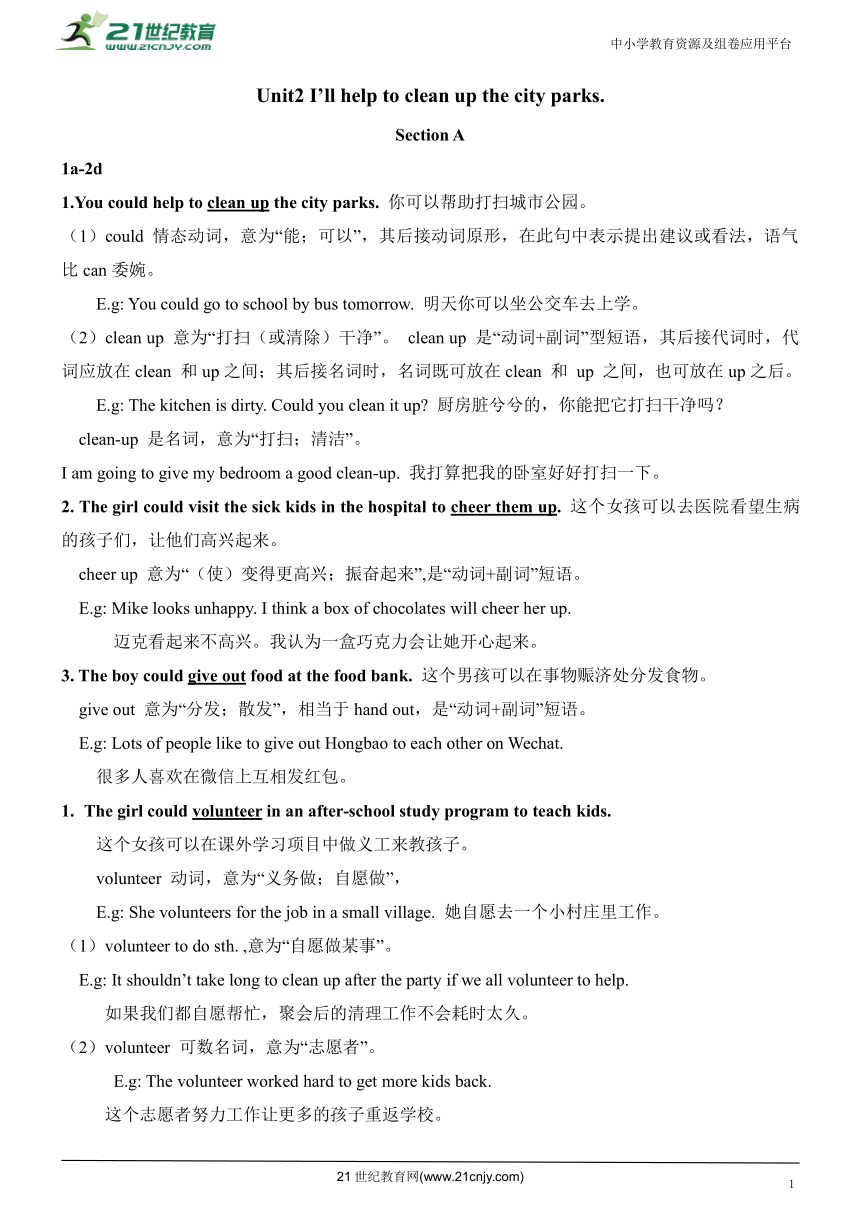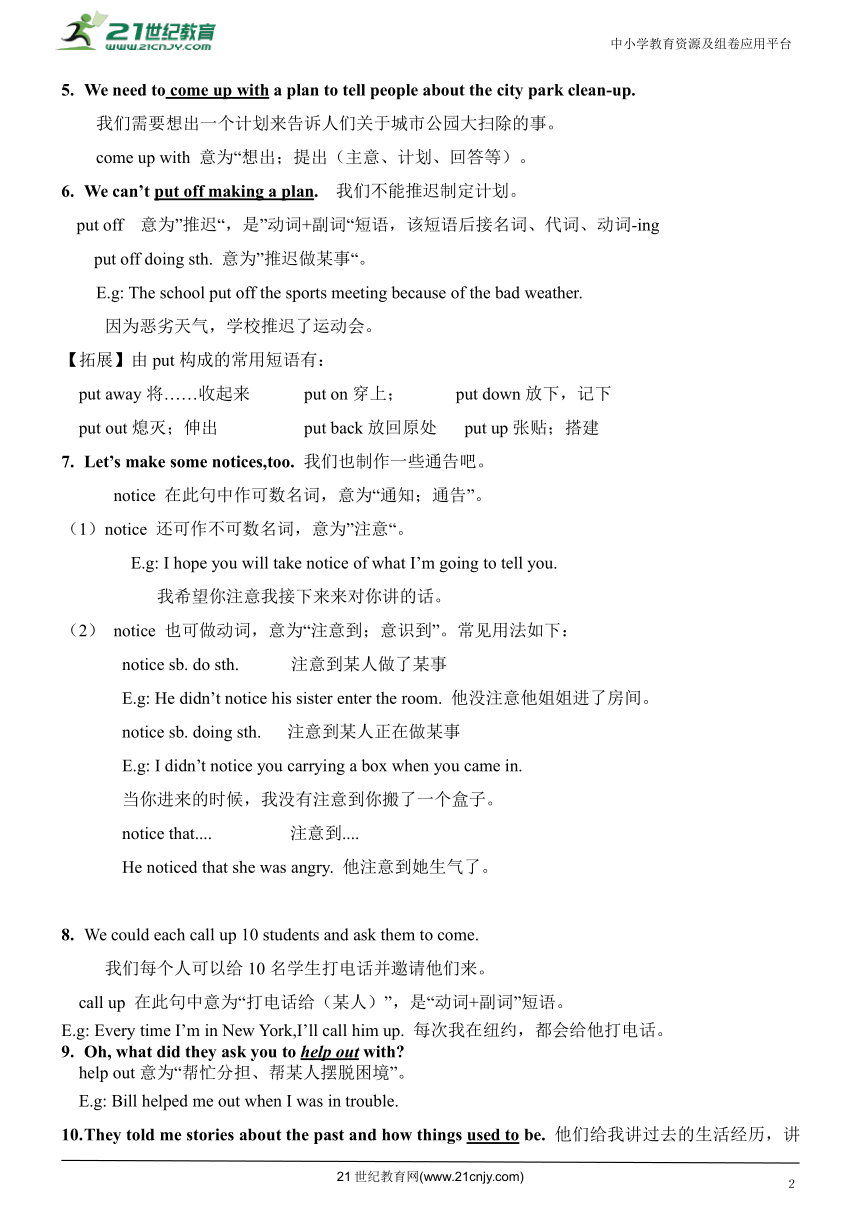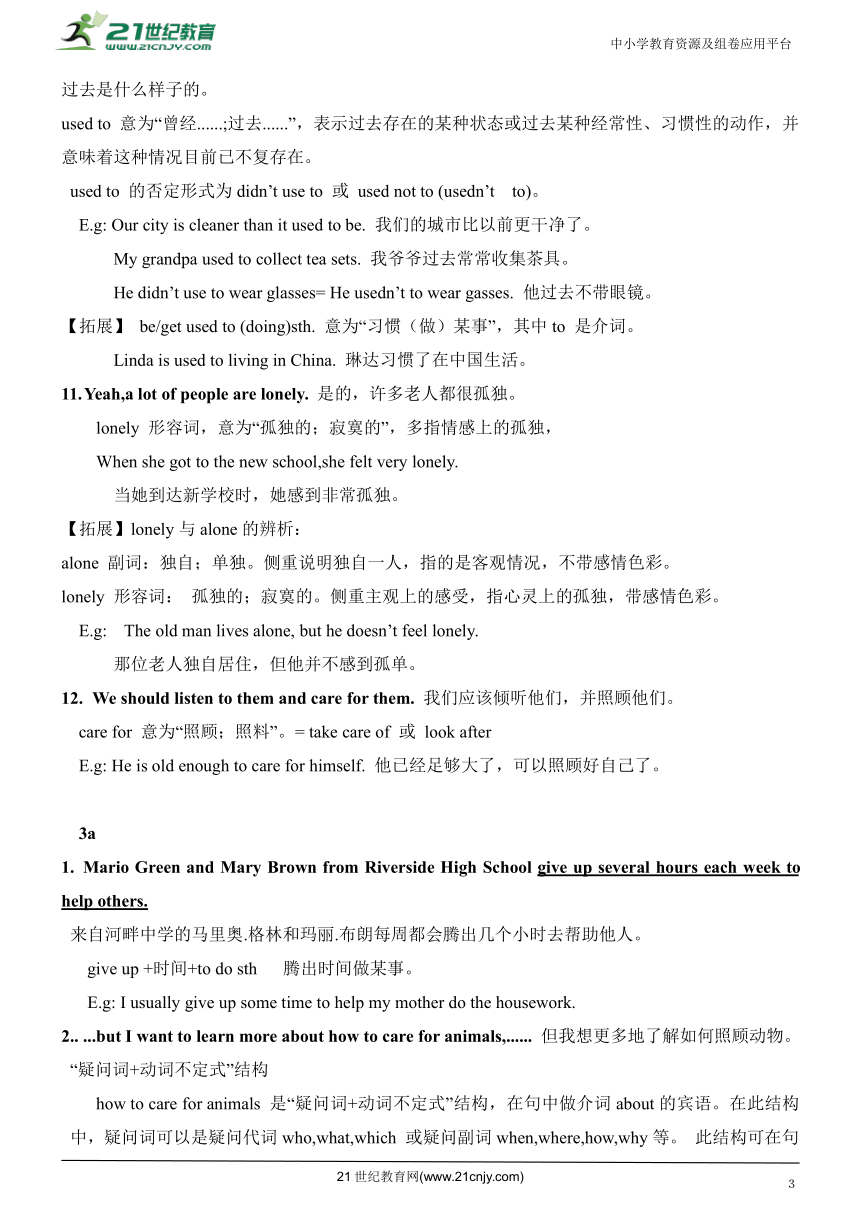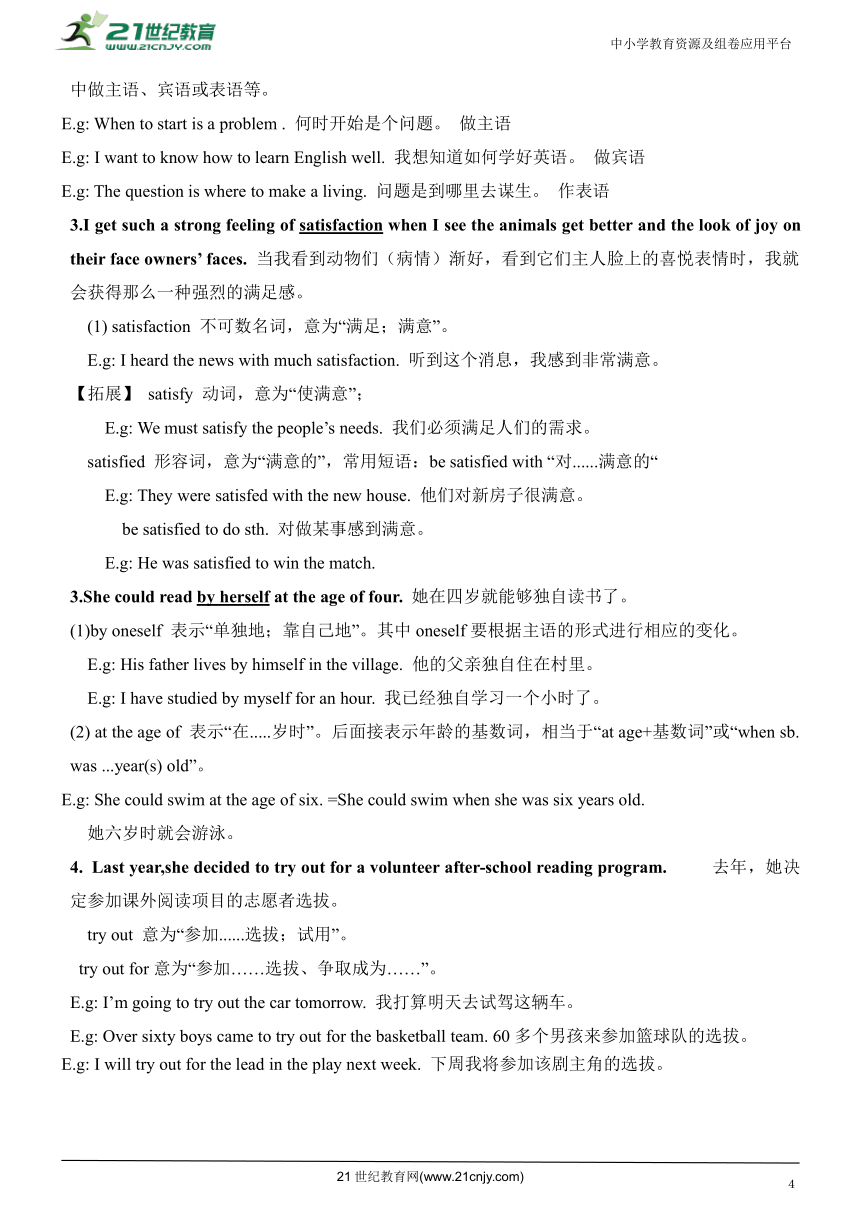Unit2 I’ll help to clean up the city parks.知识点总结归纳【人教版八年级下册英语】
文档属性
| 名称 | Unit2 I’ll help to clean up the city parks.知识点总结归纳【人教版八年级下册英语】 |  | |
| 格式 | docx | ||
| 文件大小 | 62.2KB | ||
| 资源类型 | 试卷 | ||
| 版本资源 | 人教新目标(Go for it)版 | ||
| 科目 | 英语 | ||
| 更新时间 | 2024-05-16 20:59:07 | ||
图片预览




文档简介
中小学教育资源及组卷应用平台
Unit2 I’ll help to clean up the city parks.
Section A
1a-2d
1.You could help to clean up the city parks. 你可以帮助打扫城市公园。
(1)could 情态动词,意为“能;可以”,其后接动词原形,在此句中表示提出建议或看法,语气比can委婉。
E.g: You could go to school by bus tomorrow. 明天你可以坐公交车去上学。
(2)clean up 意为“打扫(或清除)干净”。 clean up 是“动词+副词”型短语,其后接代词时,代词应放在clean 和up之间;其后接名词时,名词既可放在clean 和 up 之间,也可放在up之后。
E.g: The kitchen is dirty. Could you clean it up 厨房脏兮兮的,你能把它打扫干净吗?
clean-up 是名词,意为“打扫;清洁”。
I am going to give my bedroom a good clean-up. 我打算把我的卧室好好打扫一下。
2. The girl could visit the sick kids in the hospital to cheer them up. 这个女孩可以去医院看望生病的孩子们,让他们高兴起来。
cheer up 意为“(使)变得更高兴;振奋起来”,是“动词+副词”短语。
E.g: Mike looks unhappy. I think a box of chocolates will cheer her up.
迈克看起来不高兴。我认为一盒巧克力会让她开心起来。
3. The boy could give out food at the food bank. 这个男孩可以在事物赈济处分发食物。
give out 意为“分发;散发”,相当于hand out,是“动词+副词”短语。
E.g: Lots of people like to give out Hongbao to each other on Wechat.
很多人喜欢在微信上互相发红包。
The girl could volunteer in an after-school study program to teach kids.
这个女孩可以在课外学习项目中做义工来教孩子。
volunteer 动词,意为“义务做;自愿做”,
E.g: She volunteers for the job in a small village. 她自愿去一个小村庄里工作。
(1)volunteer to do sth. ,意为“自愿做某事”。
E.g: It shouldn’t take long to clean up after the party if we all volunteer to help.
如果我们都自愿帮忙,聚会后的清理工作不会耗时太久。
(2)volunteer 可数名词,意为“志愿者”。
E.g: The volunteer worked hard to get more kids back.
这个志愿者努力工作让更多的孩子重返学校。
We need to come up with a plan to tell people about the city park clean-up.
我们需要想出一个计划来告诉人们关于城市公园大扫除的事。
come up with 意为“想出;提出(主意、计划、回答等)。
We can’t put off making a plan. 我们不能推迟制定计划。
put off 意为”推迟“,是”动词+副词“短语,该短语后接名词、代词、动词-ing
put off doing sth. 意为”推迟做某事“。
E.g: The school put off the sports meeting because of the bad weather.
因为恶劣天气,学校推迟了运动会。
【拓展】由put构成的常用短语有:
put away将……收起来 put on穿上; put down放下,记下
put out熄灭;伸出 put back放回原处 put up张贴;搭建
Let’s make some notices,too. 我们也制作一些通告吧。
notice 在此句中作可数名词,意为“通知;通告”。
(1)notice 还可作不可数名词,意为”注意“。
E.g: I hope you will take notice of what I’m going to tell you.
我希望你注意我接下来来对你讲的话。
(2) notice 也可做动词,意为“注意到;意识到”。常见用法如下:
notice sb. do sth. 注意到某人做了某事
E.g: He didn’t notice his sister enter the room. 他没注意他姐姐进了房间。
notice sb. doing sth. 注意到某人正在做某事
E.g: I didn’t notice you carrying a box when you came in.
当你进来的时候,我没有注意到你搬了一个盒子。
notice that.... 注意到....
He noticed that she was angry. 他注意到她生气了。
We could each call up 10 students and ask them to come.
我们每个人可以给10名学生打电话并邀请他们来。
call up 在此句中意为“打电话给(某人)”,是“动词+副词”短语。
E.g: Every time I’m in New York,I’ll call him up. 每次我在纽约,都会给他打电话。
Oh, what did they ask you to help out with
help out意为“帮忙分担、帮某人摆脱困境”。
E.g: Bill helped me out when I was in trouble.
They told me stories about the past and how things used to be. 他们给我讲过去的生活经历,讲过去是什么样子的。
used to 意为“曾经......;过去......”,表示过去存在的某种状态或过去某种经常性、习惯性的动作,并意味着这种情况目前已不复存在。
used to 的否定形式为didn’t use to 或 used not to (usedn’t to)。
E.g: Our city is cleaner than it used to be. 我们的城市比以前更干净了。
My grandpa used to collect tea sets. 我爷爷过去常常收集茶具。
He didn’t use to wear glasses= He usedn’t to wear gasses. 他过去不带眼镜。
【拓展】 be/get used to (doing)sth. 意为“习惯(做)某事”,其中to 是介词。
Linda is used to living in China. 琳达习惯了在中国生活。
Yeah,a lot of people are lonely. 是的,许多老人都很孤独。
lonely 形容词,意为“孤独的;寂寞的”,多指情感上的孤独,
When she got to the new school,she felt very lonely.
当她到达新学校时,她感到非常孤独。
【拓展】lonely与alone的辨析:
alone 副词:独自;单独。侧重说明独自一人,指的是客观情况,不带感彩。
lonely 形容词: 孤独的;寂寞的。侧重主观上的感受,指心灵上的孤独,带感彩。
E.g: The old man lives alone, but he doesn’t feel lonely.
那位老人独自居住,但他并不感到孤单。
We should listen to them and care for them. 我们应该倾听他们,并照顾他们。
care for 意为“照顾;照料”。= take care of 或 look after
E.g: He is old enough to care for himself. 他已经足够大了,可以照顾好自己了。
3a
Mario Green and Mary Brown from Riverside High School give up several hours each week to help others.
来自河畔中学的马里奥.格林和玛丽.布朗每周都会腾出几个小时去帮助他人。
give up +时间+to do sth 腾出时间做某事。
E.g: I usually give up some time to help my mother do the housework.
2.. ...but I want to learn more about how to care for animals,...... 但我想更多地了解如何照顾动物。
“疑问词+动词不定式”结构
how to care for animals 是“疑问词+动词不定式”结构,在句中做介词about的宾语。在此结构中,疑问词可以是疑问代词who,what,which 或疑问副词when,where,how,why等。 此结构可在句中做主语、宾语或表语等。
E.g: When to start is a problem . 何时开始是个问题。 做主语
E.g: I want to know how to learn English well. 我想知道如何学好英语。 做宾语
E.g: The question is where to make a living. 问题是到哪里去谋生。 作表语
3.I get such a strong feeling of satisfaction when I see the animals get better and the look of joy on their face owners’ faces. 当我看到动物们(病情)渐好,看到它们主人脸上的喜悦表情时,我就会获得那么一种强烈的满足感。
(1) satisfaction 不可数名词,意为“满足;满意”。
E.g: I heard the news with much satisfaction. 听到这个消息,我感到非常满意。
【拓展】 satisfy 动词,意为“使满意”;
E.g: We must satisfy the people’s needs. 我们必须满足人们的需求。
satisfied 形容词,意为“满意的”,常用短语:be satisfied with “对......满意的“
E.g: They were satisfed with the new house. 他们对新房子很满意。
be satisfied to do sth. 对做某事感到满意。
E.g: He was satisfied to win the match.
3.She could read by herself at the age of four. 她在四岁就能够独自读书了。
(1)by oneself 表示“单独地;靠自己地”。其中oneself要根据主语的形式进行相应的变化。
E.g: His father lives by himself in the village. 他的父亲独自住在村里。
E.g: I have studied by myself for an hour. 我已经独自学习一个小时了。
(2) at the age of 表示“在.....岁时”。后面接表示年龄的基数词,相当于“at age+基数词”或“when sb. was ...year(s) old”。
E.g: She could swim at the age of six. =She could swim when she was six years old.
她六岁时就会游泳。
Last year,she decided to try out for a volunteer after-school reading program. 去年,她决定参加课外阅读项目的志愿者选拔。
try out 意为“参加......选拔;试用”。
try out for意为“参加……选拔、争取成为……”。
E.g: I’m going to try out the car tomorrow. 我打算明天去试驾这辆车。
E.g: Over sixty boys came to try out for the basketball team. 60多个男孩来参加篮球队的选拔。
E.g: I will try out for the lead in the play next week. 下周我将参加该剧主角的选拔。
Grammar Focus
动词不定式
构成: to+动词原形
(一)动词相同,但副词或介词不同
A .give up B. give out C. give away D. give off.
(二)副词或介词相同,但动词不同
A.drop out B. come out C. leave out
(三)动词、副词或介词均不相同
A. give out B. take in C. show off D. carry on
注意:代词放中间
get off(下车) get on(上车)
put out (扑灭) put down(记下)
put on(穿上、上演) put off(推迟)
take care of (照料) take away(带走、拿走)
take off(脱下、起飞) take out of(取出、将…带出)
get along (相处) get up(起床),
get away(离开) get back (回来)
look up(查找) pick up (挑选、选中、拾起)
clean up(清扫) give up (放弃)
stay up(熬夜) wake up(醒来)
put up(建造、举起) eat up(吃光)
use up(用光、用完) cut up(切碎)
set off (动身、启程) turn off(关掉)
wait for(等候) look for(寻找)
(1) 作主语
学好英语很重要。
to learn English well is important.= It’s important to learn English well.
2. 放弃吸烟是对的。
to give up smoking is right.= It’s right to give up smoking.
(2) 作宾语
plan to do sth.
want to do sth./ would like to do sh.
learn to do sth.
hope to do sth./ wish to do sth.
agree to do sth. help to do sth.
prepare to do sth. decide to do sth.
refuse to do sth expect to do sth.
promise to do sth. try to do sth.
作宾语补足语 否定式:…not to do
1. 叫某人做某事 ask/tell sb. to do sth.
2. 想要某人做某事 want sb. to do sth./would like sb. to do sth.
3. 允许某人做某事 allow sb. to do sth.
4. 鼓励某人做某事 encourage sb. to do sth.
5. 邀请某人做某事 invite sb. to do sth.
(4) 作表语
1. 我的工作是教英语。
My job is to teach English
2. 眼见为实。
To see is to believe
(5) 作定语
1. 给我一些喝的东西。
Give me something to drink.
2. 他们有许多吃的食物。
They have much food to eat
3. 我有一支笔来写。
I have a pen to write with. (不及物动词,介词不能省略)
Section B
1a
I take after my mother.
take after意为“长得像”。
I fixed it up.
fix up意为“修理”,代词作宾语时,放在fix和up中间。
I repaired it.
repair
及物动词, 修理;修补;修缮(房屋等)
He repairs old furniture. 他修理旧家具。
【拓展】repair, mend与fix的辨析
repair 表示修理结构复杂和破损较大的东西。
Mary repaired the radio just for the fun of it.
mend 着重指修理有破洞和裂痕的东西等。
My mother mended clothes for me yesterday. 。
fix 侧重于“安装”,也可用作“修理”,常指修理小东西,如钟表、自行车、小电器等。
The workers are fixing the machine.
I gave it away.
give away意为“捐赠、赠送”,还可以表示“泄露(秘密)”。
I’m similar to her.
be similar to意为“与……相似”,be similar in“在……方面类似”。
I didn’t keep it.
① keep sth. 保留某物
② keep doing sth. 一直做某事
③ keep+adj. 保持……
④ keep sb./sth.+adj./介词短语 保持某人/某物……
⑤ keep sb. doing sth. 保持某人做某事
2a
I’d like to thank you for giving money to Animal Helpers.
我想感谢你为“动物帮手”捐款。
thank you for 意为“因.......而感谢你”,介词for后接名词、代词或动词-ing形式做宾语。
E.g: Thank you for your advice. 谢谢你的建议。
E.g: Thank you for giving away so many books. 感谢你捐赠了这么多书。
give sth. to sb. 意为“把某物给某人”,相当于 give sb. sth.
E.g: Mike gives the book to me. = Mike gives me the book.迈克把那本书给了我。
2. I’m sure you know that this group was set up to help disabled people like me. 我相信你知道这个组织是为帮助像我一样的残疾人而建立的。 (1) set up 表示“建起;设立”,常与表示组织、机构、团体等意义的名词连用,
E.g: They set up a new business. 他们创办了一家新公司。
A new middle school has been set up in the village.这个村子里建了一所新中学。
(2)disabled 形容词,意为“丧失能力的;有残疾的”。 the disabled 表示“残疾人”。“the +形容词”表示一类人,在句中做主语时,谓语动词要用复数形式。
E.g: It is our duty to help disabled people. 帮助残疾人是我们的职责。
The disabled need looking after. 残疾人需要帮助。
3.What would it be like to be blind or deaf 人要是看不见或听不见会是什么样子呢?
blind 形容词,意为“瞎的;失明的”,其主语是人,不是眼睛。
go/become blind 意为“失明”。
E.g: Look! A dog is leading a blind man across the road. 看!一只狗正在引导一个盲人过马路。
be blind in...(眼)失明
E.g: She is blind in the right eye. 她右眼失明了。
deaf 形容词,意为“聋的”。 表示哪只耳朵失聪要用介词in。
E.g: The old man is deaf in the left ear. 这位老人左耳聋了。
4.Or imagine you can’t walk or use your hands easily.或者想象一下你不能自如的走也不能自如的使用双手。
Imagine 动词, 想象,推测”,常用于结构:
imagine (sb.) doing sth. 想象(某人)做某事
E.g: imagine that从句、wh-从句 想象.....
E.g: We can’t imagine what China will be like in the future.
E.g: I can’t imagine leaving all my friends.
5.You helped to make it possible for me to have Lucky. 有了你的帮助,我才有可能拥有“幸运儿” (狗名)。
“make it+形容词(+for sb.)+to do sth
E.g: Sports can make it easier for people to unify.
体育可以让人们更容易地统一起来。
6.Lucky makes a big difference to my life. “幸运儿”对我的生活产生了很大的影响。
make a difference (to...) 意为“(对......)产生影响/起作用”。
difference 前面可加big,great等修饰词;to是介词,其后可接名词,代词或动词-ing形式。
g: Inventions usually make a big difference to people’s lives.
发明通常对人们的生活有很大的影响。
【拓展】 make no difference to 意为“对......没有作用/影响/关系”。
E.gE.g: : It makes no difference to me when he will come.
他什么时候来对我来说没有影响。
7.She talked to Animal Helpers about getting me a special trained dog. 她与“动物帮手”组织联系,试图给我找一只特殊的,经过训练的狗。
train 及物动词,意为“训练”。其名词形式为training “训练“
E.g: Try to train children to be good citizens. 努力把孩子门培养成好公民。
train sb./sth to do sth. “训练某人/某物做某事”,
E.g: We can train a dog to help blind people.
train sb. in sth. “在某方面培养或训练某人
E.g: The teacher trains us in writing.
【拓展】train 的其他用法
①train 用作不及物动词,表示“锻炼;相当于exercise.
The boy is training for the coming sports meeting. 这个男孩正在为即将到来的运动会而接受训练。
②train 用作可数名词,意为“火车”。
I must get up early to catch the train. 我必须早起赶火车。
作文
假如你是Lisa,是一名中学生。你想根据自己的兴趣和爱好,向志愿者中心(Volunteers’ Center)申请参加志愿者工作。请根据以下要点,写一篇自荐信给志愿者中心。词数为100字左右。开头和结尾已经给出。
要点可以包括: 1. 你的兴趣和爱好;
2. 你哪些时间是空闲的;
3. 你想做何种工作;
4. 你为什么想做这份工作。
Dear Sir or Madam,
I am glad to know that you give primary students chances of being volunteers to help others. My name is Lisa, a middle school student who is interested in singing and dancing. I am free after 5 o’clock every afternoon. What’s more, I am good with children, so I think I am able to volunteer in an after-school study program to teach kids to sing and dance. In my eyes, it’s better to give than to take. Every time I see the happy faces of the little kids, I get such a strong feeling of satisfaction. Helping others makes it possible for me to do meaningful things. So please give me the chance to do the job.
Yours truly,
Lisa
21世纪教育网(www.21cnjy.com)
Unit2 I’ll help to clean up the city parks.
Section A
1a-2d
1.You could help to clean up the city parks. 你可以帮助打扫城市公园。
(1)could 情态动词,意为“能;可以”,其后接动词原形,在此句中表示提出建议或看法,语气比can委婉。
E.g: You could go to school by bus tomorrow. 明天你可以坐公交车去上学。
(2)clean up 意为“打扫(或清除)干净”。 clean up 是“动词+副词”型短语,其后接代词时,代词应放在clean 和up之间;其后接名词时,名词既可放在clean 和 up 之间,也可放在up之后。
E.g: The kitchen is dirty. Could you clean it up 厨房脏兮兮的,你能把它打扫干净吗?
clean-up 是名词,意为“打扫;清洁”。
I am going to give my bedroom a good clean-up. 我打算把我的卧室好好打扫一下。
2. The girl could visit the sick kids in the hospital to cheer them up. 这个女孩可以去医院看望生病的孩子们,让他们高兴起来。
cheer up 意为“(使)变得更高兴;振奋起来”,是“动词+副词”短语。
E.g: Mike looks unhappy. I think a box of chocolates will cheer her up.
迈克看起来不高兴。我认为一盒巧克力会让她开心起来。
3. The boy could give out food at the food bank. 这个男孩可以在事物赈济处分发食物。
give out 意为“分发;散发”,相当于hand out,是“动词+副词”短语。
E.g: Lots of people like to give out Hongbao to each other on Wechat.
很多人喜欢在微信上互相发红包。
The girl could volunteer in an after-school study program to teach kids.
这个女孩可以在课外学习项目中做义工来教孩子。
volunteer 动词,意为“义务做;自愿做”,
E.g: She volunteers for the job in a small village. 她自愿去一个小村庄里工作。
(1)volunteer to do sth. ,意为“自愿做某事”。
E.g: It shouldn’t take long to clean up after the party if we all volunteer to help.
如果我们都自愿帮忙,聚会后的清理工作不会耗时太久。
(2)volunteer 可数名词,意为“志愿者”。
E.g: The volunteer worked hard to get more kids back.
这个志愿者努力工作让更多的孩子重返学校。
We need to come up with a plan to tell people about the city park clean-up.
我们需要想出一个计划来告诉人们关于城市公园大扫除的事。
come up with 意为“想出;提出(主意、计划、回答等)。
We can’t put off making a plan. 我们不能推迟制定计划。
put off 意为”推迟“,是”动词+副词“短语,该短语后接名词、代词、动词-ing
put off doing sth. 意为”推迟做某事“。
E.g: The school put off the sports meeting because of the bad weather.
因为恶劣天气,学校推迟了运动会。
【拓展】由put构成的常用短语有:
put away将……收起来 put on穿上; put down放下,记下
put out熄灭;伸出 put back放回原处 put up张贴;搭建
Let’s make some notices,too. 我们也制作一些通告吧。
notice 在此句中作可数名词,意为“通知;通告”。
(1)notice 还可作不可数名词,意为”注意“。
E.g: I hope you will take notice of what I’m going to tell you.
我希望你注意我接下来来对你讲的话。
(2) notice 也可做动词,意为“注意到;意识到”。常见用法如下:
notice sb. do sth. 注意到某人做了某事
E.g: He didn’t notice his sister enter the room. 他没注意他姐姐进了房间。
notice sb. doing sth. 注意到某人正在做某事
E.g: I didn’t notice you carrying a box when you came in.
当你进来的时候,我没有注意到你搬了一个盒子。
notice that.... 注意到....
He noticed that she was angry. 他注意到她生气了。
We could each call up 10 students and ask them to come.
我们每个人可以给10名学生打电话并邀请他们来。
call up 在此句中意为“打电话给(某人)”,是“动词+副词”短语。
E.g: Every time I’m in New York,I’ll call him up. 每次我在纽约,都会给他打电话。
Oh, what did they ask you to help out with
help out意为“帮忙分担、帮某人摆脱困境”。
E.g: Bill helped me out when I was in trouble.
They told me stories about the past and how things used to be. 他们给我讲过去的生活经历,讲过去是什么样子的。
used to 意为“曾经......;过去......”,表示过去存在的某种状态或过去某种经常性、习惯性的动作,并意味着这种情况目前已不复存在。
used to 的否定形式为didn’t use to 或 used not to (usedn’t to)。
E.g: Our city is cleaner than it used to be. 我们的城市比以前更干净了。
My grandpa used to collect tea sets. 我爷爷过去常常收集茶具。
He didn’t use to wear glasses= He usedn’t to wear gasses. 他过去不带眼镜。
【拓展】 be/get used to (doing)sth. 意为“习惯(做)某事”,其中to 是介词。
Linda is used to living in China. 琳达习惯了在中国生活。
Yeah,a lot of people are lonely. 是的,许多老人都很孤独。
lonely 形容词,意为“孤独的;寂寞的”,多指情感上的孤独,
When she got to the new school,she felt very lonely.
当她到达新学校时,她感到非常孤独。
【拓展】lonely与alone的辨析:
alone 副词:独自;单独。侧重说明独自一人,指的是客观情况,不带感彩。
lonely 形容词: 孤独的;寂寞的。侧重主观上的感受,指心灵上的孤独,带感彩。
E.g: The old man lives alone, but he doesn’t feel lonely.
那位老人独自居住,但他并不感到孤单。
We should listen to them and care for them. 我们应该倾听他们,并照顾他们。
care for 意为“照顾;照料”。= take care of 或 look after
E.g: He is old enough to care for himself. 他已经足够大了,可以照顾好自己了。
3a
Mario Green and Mary Brown from Riverside High School give up several hours each week to help others.
来自河畔中学的马里奥.格林和玛丽.布朗每周都会腾出几个小时去帮助他人。
give up +时间+to do sth 腾出时间做某事。
E.g: I usually give up some time to help my mother do the housework.
2.. ...but I want to learn more about how to care for animals,...... 但我想更多地了解如何照顾动物。
“疑问词+动词不定式”结构
how to care for animals 是“疑问词+动词不定式”结构,在句中做介词about的宾语。在此结构中,疑问词可以是疑问代词who,what,which 或疑问副词when,where,how,why等。 此结构可在句中做主语、宾语或表语等。
E.g: When to start is a problem . 何时开始是个问题。 做主语
E.g: I want to know how to learn English well. 我想知道如何学好英语。 做宾语
E.g: The question is where to make a living. 问题是到哪里去谋生。 作表语
3.I get such a strong feeling of satisfaction when I see the animals get better and the look of joy on their face owners’ faces. 当我看到动物们(病情)渐好,看到它们主人脸上的喜悦表情时,我就会获得那么一种强烈的满足感。
(1) satisfaction 不可数名词,意为“满足;满意”。
E.g: I heard the news with much satisfaction. 听到这个消息,我感到非常满意。
【拓展】 satisfy 动词,意为“使满意”;
E.g: We must satisfy the people’s needs. 我们必须满足人们的需求。
satisfied 形容词,意为“满意的”,常用短语:be satisfied with “对......满意的“
E.g: They were satisfed with the new house. 他们对新房子很满意。
be satisfied to do sth. 对做某事感到满意。
E.g: He was satisfied to win the match.
3.She could read by herself at the age of four. 她在四岁就能够独自读书了。
(1)by oneself 表示“单独地;靠自己地”。其中oneself要根据主语的形式进行相应的变化。
E.g: His father lives by himself in the village. 他的父亲独自住在村里。
E.g: I have studied by myself for an hour. 我已经独自学习一个小时了。
(2) at the age of 表示“在.....岁时”。后面接表示年龄的基数词,相当于“at age+基数词”或“when sb. was ...year(s) old”。
E.g: She could swim at the age of six. =She could swim when she was six years old.
她六岁时就会游泳。
Last year,she decided to try out for a volunteer after-school reading program. 去年,她决定参加课外阅读项目的志愿者选拔。
try out 意为“参加......选拔;试用”。
try out for意为“参加……选拔、争取成为……”。
E.g: I’m going to try out the car tomorrow. 我打算明天去试驾这辆车。
E.g: Over sixty boys came to try out for the basketball team. 60多个男孩来参加篮球队的选拔。
E.g: I will try out for the lead in the play next week. 下周我将参加该剧主角的选拔。
Grammar Focus
动词不定式
构成: to+动词原形
(一)动词相同,但副词或介词不同
A .give up B. give out C. give away D. give off.
(二)副词或介词相同,但动词不同
A.drop out B. come out C. leave out
(三)动词、副词或介词均不相同
A. give out B. take in C. show off D. carry on
注意:代词放中间
get off(下车) get on(上车)
put out (扑灭) put down(记下)
put on(穿上、上演) put off(推迟)
take care of (照料) take away(带走、拿走)
take off(脱下、起飞) take out of(取出、将…带出)
get along (相处) get up(起床),
get away(离开) get back (回来)
look up(查找) pick up (挑选、选中、拾起)
clean up(清扫) give up (放弃)
stay up(熬夜) wake up(醒来)
put up(建造、举起) eat up(吃光)
use up(用光、用完) cut up(切碎)
set off (动身、启程) turn off(关掉)
wait for(等候) look for(寻找)
(1) 作主语
学好英语很重要。
to learn English well is important.= It’s important to learn English well.
2. 放弃吸烟是对的。
to give up smoking is right.= It’s right to give up smoking.
(2) 作宾语
plan to do sth.
want to do sth./ would like to do sh.
learn to do sth.
hope to do sth./ wish to do sth.
agree to do sth. help to do sth.
prepare to do sth. decide to do sth.
refuse to do sth expect to do sth.
promise to do sth. try to do sth.
作宾语补足语 否定式:…not to do
1. 叫某人做某事 ask/tell sb. to do sth.
2. 想要某人做某事 want sb. to do sth./would like sb. to do sth.
3. 允许某人做某事 allow sb. to do sth.
4. 鼓励某人做某事 encourage sb. to do sth.
5. 邀请某人做某事 invite sb. to do sth.
(4) 作表语
1. 我的工作是教英语。
My job is to teach English
2. 眼见为实。
To see is to believe
(5) 作定语
1. 给我一些喝的东西。
Give me something to drink.
2. 他们有许多吃的食物。
They have much food to eat
3. 我有一支笔来写。
I have a pen to write with. (不及物动词,介词不能省略)
Section B
1a
I take after my mother.
take after意为“长得像”。
I fixed it up.
fix up意为“修理”,代词作宾语时,放在fix和up中间。
I repaired it.
repair
及物动词, 修理;修补;修缮(房屋等)
He repairs old furniture. 他修理旧家具。
【拓展】repair, mend与fix的辨析
repair 表示修理结构复杂和破损较大的东西。
Mary repaired the radio just for the fun of it.
mend 着重指修理有破洞和裂痕的东西等。
My mother mended clothes for me yesterday. 。
fix 侧重于“安装”,也可用作“修理”,常指修理小东西,如钟表、自行车、小电器等。
The workers are fixing the machine.
I gave it away.
give away意为“捐赠、赠送”,还可以表示“泄露(秘密)”。
I’m similar to her.
be similar to意为“与……相似”,be similar in“在……方面类似”。
I didn’t keep it.
① keep sth. 保留某物
② keep doing sth. 一直做某事
③ keep+adj. 保持……
④ keep sb./sth.+adj./介词短语 保持某人/某物……
⑤ keep sb. doing sth. 保持某人做某事
2a
I’d like to thank you for giving money to Animal Helpers.
我想感谢你为“动物帮手”捐款。
thank you for 意为“因.......而感谢你”,介词for后接名词、代词或动词-ing形式做宾语。
E.g: Thank you for your advice. 谢谢你的建议。
E.g: Thank you for giving away so many books. 感谢你捐赠了这么多书。
give sth. to sb. 意为“把某物给某人”,相当于 give sb. sth.
E.g: Mike gives the book to me. = Mike gives me the book.迈克把那本书给了我。
2. I’m sure you know that this group was set up to help disabled people like me. 我相信你知道这个组织是为帮助像我一样的残疾人而建立的。 (1) set up 表示“建起;设立”,常与表示组织、机构、团体等意义的名词连用,
E.g: They set up a new business. 他们创办了一家新公司。
A new middle school has been set up in the village.这个村子里建了一所新中学。
(2)disabled 形容词,意为“丧失能力的;有残疾的”。 the disabled 表示“残疾人”。“the +形容词”表示一类人,在句中做主语时,谓语动词要用复数形式。
E.g: It is our duty to help disabled people. 帮助残疾人是我们的职责。
The disabled need looking after. 残疾人需要帮助。
3.What would it be like to be blind or deaf 人要是看不见或听不见会是什么样子呢?
blind 形容词,意为“瞎的;失明的”,其主语是人,不是眼睛。
go/become blind 意为“失明”。
E.g: Look! A dog is leading a blind man across the road. 看!一只狗正在引导一个盲人过马路。
be blind in...(眼)失明
E.g: She is blind in the right eye. 她右眼失明了。
deaf 形容词,意为“聋的”。 表示哪只耳朵失聪要用介词in。
E.g: The old man is deaf in the left ear. 这位老人左耳聋了。
4.Or imagine you can’t walk or use your hands easily.或者想象一下你不能自如的走也不能自如的使用双手。
Imagine 动词, 想象,推测”,常用于结构:
imagine (sb.) doing sth. 想象(某人)做某事
E.g: imagine that从句、wh-从句 想象.....
E.g: We can’t imagine what China will be like in the future.
E.g: I can’t imagine leaving all my friends.
5.You helped to make it possible for me to have Lucky. 有了你的帮助,我才有可能拥有“幸运儿” (狗名)。
“make it+形容词(+for sb.)+to do sth
E.g: Sports can make it easier for people to unify.
体育可以让人们更容易地统一起来。
6.Lucky makes a big difference to my life. “幸运儿”对我的生活产生了很大的影响。
make a difference (to...) 意为“(对......)产生影响/起作用”。
difference 前面可加big,great等修饰词;to是介词,其后可接名词,代词或动词-ing形式。
g: Inventions usually make a big difference to people’s lives.
发明通常对人们的生活有很大的影响。
【拓展】 make no difference to 意为“对......没有作用/影响/关系”。
E.gE.g: : It makes no difference to me when he will come.
他什么时候来对我来说没有影响。
7.She talked to Animal Helpers about getting me a special trained dog. 她与“动物帮手”组织联系,试图给我找一只特殊的,经过训练的狗。
train 及物动词,意为“训练”。其名词形式为training “训练“
E.g: Try to train children to be good citizens. 努力把孩子门培养成好公民。
train sb./sth to do sth. “训练某人/某物做某事”,
E.g: We can train a dog to help blind people.
train sb. in sth. “在某方面培养或训练某人
E.g: The teacher trains us in writing.
【拓展】train 的其他用法
①train 用作不及物动词,表示“锻炼;相当于exercise.
The boy is training for the coming sports meeting. 这个男孩正在为即将到来的运动会而接受训练。
②train 用作可数名词,意为“火车”。
I must get up early to catch the train. 我必须早起赶火车。
作文
假如你是Lisa,是一名中学生。你想根据自己的兴趣和爱好,向志愿者中心(Volunteers’ Center)申请参加志愿者工作。请根据以下要点,写一篇自荐信给志愿者中心。词数为100字左右。开头和结尾已经给出。
要点可以包括: 1. 你的兴趣和爱好;
2. 你哪些时间是空闲的;
3. 你想做何种工作;
4. 你为什么想做这份工作。
Dear Sir or Madam,
I am glad to know that you give primary students chances of being volunteers to help others. My name is Lisa, a middle school student who is interested in singing and dancing. I am free after 5 o’clock every afternoon. What’s more, I am good with children, so I think I am able to volunteer in an after-school study program to teach kids to sing and dance. In my eyes, it’s better to give than to take. Every time I see the happy faces of the little kids, I get such a strong feeling of satisfaction. Helping others makes it possible for me to do meaningful things. So please give me the chance to do the job.
Yours truly,
Lisa
21世纪教育网(www.21cnjy.com)
同课章节目录
- Unit 1 What's the matter?
- Section A
- Section B
- Unit 2 I'll help to clean up the city parks.
- Section A
- Section B
- Unit 3 Could you please clean your room?
- Section A
- Section B
- Unit 4 Why don't you talk to your parents?
- Section A
- Section B
- Unit 5 What were you doing when the rainstorm came
- Section A
- Section B
- Review of Units 1-5
- Unit 6 An old man tried to move the mountains.
- Section A
- Section B
- Unit 7 What's the highest mountain in the world?
- Section A
- Section B
- Unit 8 Have you read Treasure Island yet?
- Section A
- Section B
- Unit 9 Have you ever been to a museum?
- Section A
- Section B
- Unit 10 I've had this bike for three years.
- Section A
- Section B
